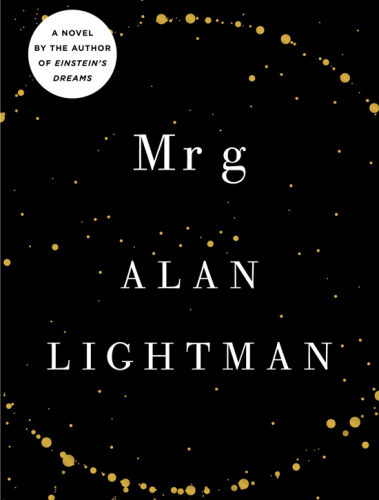
Mr g
A Novel About the Creation
کتاب های مرتبط
- اطلاعات
- نقد و بررسی
- دیدگاه کاربران
نقد و بررسی

October 10, 2011
Physicist and author Lightman (Einstein’s Dreams) offers another rumination in the form of a touching, imaginative rendition of God’s creation of the universe. Bored with the Void, his bickersome Aunt Penelope and tenderhearted Uncle Deva his only companions through Nothingness, the genius Nephew casts about in his infinite imagination for change, form, and meaning. Seized by an idea, he creates time—past, present, and future—suddenly injecting structure and motion into the “endless sleep” they’d heretofore inhabited. From time follows space and energy, the creation of universes, one of which Nephew favors, calling it Aalam-104729 (after “the ten thousandth prime number in base ten”), endowing it with laws of symmetry, relativity, and causality, and filling it with matter, so that it begins to develop life. Aunt and uncle are thrilled with their new plaything, yet the contrarian Belhor urges God to let the animate creatures have free will, thereby permitting great suffering among them, but also joy. While Belhor insists that the creatures live mean, insignificant lives, and that good and evil are relative but necessary, God sees a grandeur and beauty in their individuality. Above all, the immortal characters are changed by their brush with the enterprising, however doomed, mortals, bringing this elucidating treatment of quantum physics to an affecting, hopeful conclusion.

December 1, 2011
In his sixth novel, physicist Lightman (Einstein's Dreams, 1993, etc.) playfully bridges the gap between creationism and evolution by having the Creator Himself explain how the whole shebang started. He's Mr g in the title, and unnamed in the text, but known to the world as God. He's been living and sleeping in the Void, along with his Aunt Penelope and Uncle Deva. These down-home characters, who squabble like any old married couple, provide a domestic background for their Nephew. It's a question of scale. Though God's upcoming enterprise, the creation of the universe, is vast, it's being designed by a modest family man. First comes the creation of time, followed by space and energy, and then a universe, which He names Aalam-104729. There's a rush of subatomic particles and atoms and a lot of textbook physics, well orchestrated. The key moment comes with the making of the molecules. Cause and effect, muses God, in enraptured passivity, the Creator standing back to admire evolution, which will lead to animate matter. Will His creatures have free will? That question is raised by a stranger, an immortal named Belhor who has been monitoring the creation. Way in the future he will be the Devil, but right now he is a stimulating interlocutor for God, who takes his question to heart. God learns even as he creates: the capacity of the mind is a case in point. Questions of suffering, and good and evil, are addressed, though not with the same rigor as quantum physics. Towards the end of this short novel Lightman appears to be running out of material. There's an altogether too cute chapter in which Aunt Penelope gets a dress of pink stars, a whole galaxy; a disruptive visit by Belhor to an opera house on a waterlogged planet is just filler. A grab-bag of physics, philosophical inquiry and family tomfoolery that fails to cohere.
(COPYRIGHT (2011) KIRKUS REVIEWS/NIELSEN BUSINESS MEDIA, INC. ALL RIGHTS RESERVED.)

September 1, 2011
In his new book, Lightman (Einstein's Dreams) assumes the voice of God--God being the titular Mr g. The Devil makes an appearance early on with vexing questions like "Do you think it is possible for a thing and its opposite both to be true?" But Mr g goes ahead to create space, time, and matter all the way up to sentient beings with existential quandaries, finally concluding that "this relationship between time and space was also beautiful and good." (Lightman's background as a theoretical physicist serves him well here.) Still, the demons Baphomet and Belhor keep showing up with more questions about free will. The novel's not as heavy as the subjects imply. This God seems young and caught between his squabbling Aunt Penelope and Uncle Deva. Though Lightman's clever irreverence recalls Salman Rushdie and Kevin Brockmeier, his plainspoken style lends the book a fitting earnestness, although the characters are less interesting than the scientific details. VERDICT Readers who don't mind the liberties the author takes with the sacred might enjoy this scienced fiction.--Travis Fristoe, Alachua Cty. Lib. Dist., FL
Copyright 2011 Library Journal, LLC Used with permission.

Starred review from November 15, 2011
Novelist and physicist Lightman (Ghost, 2007) takes us to the Void, where three entities, the genius Mr g, fussy Aunt Penelope, and kind Uncle Deva, loll about until Mr g expresses his intention of doing something, thus instantly establishing a past (when nothing was done) and, therefore, time itself. He soon creates space and energy, which prompts this meditative thinker to come up with quantum physics in order to weave a bit of artistic ambiguity into the universe he playfully sets in motion. A stranger, Belhor, inexplicably appears, asking annoying questions about Mr g's ability to control his creation, thus adding philosophical and spiritual dimensions to the dazzling processes under way. Fluent in the vivid language of particle physics, from oscillations and helices to gluons and quarks, Lightman rhapsodically charts the very geometry of existence, from the birth of stars to the first stirrings of life and the evolution of human beings. As glorious life unfolds by mindless chance, the creator himself is amplified and enlarged by its complex and poignant beauty. With iridescent precision, fairy-tale wonder, and brainy humor, Lightman crafts an enthralling and provocative cosmic parable that offers a startlingly fresh perspective on the mysteries of the universe and the paradoxical human condition.(Reprinted with permission of Booklist, copyright 2011, American Library Association.)

























دیدگاه کاربران